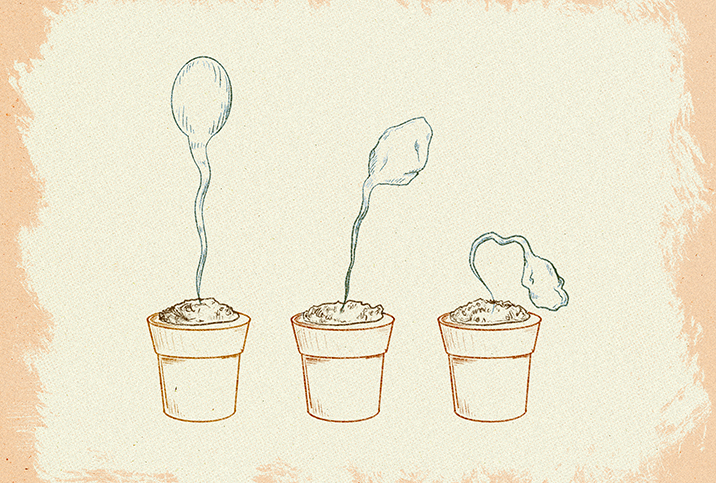Coping With Men's Infertility

Male infertility has no outward indications, which means most men won't uncover it until they try to conceive a child.
Your doctor is the best source of information, but what should you do with the information provided? What actions should you or your partner take? What are your options? How do other men cope with being infertile?
An overview of male infertility
A man is considered infertile if he cannot get his fertile partner pregnant after having unprotected sex over an extended period of time, usually one year. Infertility occurs in about 15 percent of couples, with one-third of the cases attributed to women's issues, one-third to men's issues and one-third to both partners' issues or unknown factors. Infertility can be caused by many factors, including genetic deficiencies, problems in the reproductive system, unhealthy sperm or low sperm count.
While low sperm count and other fertility issues can happen to anyone, there are elements that increase their probability. Contributing factors to male infertility include:
- Age: Men 45 years of age or older are about five times more likely to find that it takes longer—more than a year—to impregnate their partner.
- Weight: Research indicates that obese men are about twice as likely to produce less semen than men of healthy weight.
- Lifestyle: Studies indicate that men who smoke are at an increased risk for having not only low sperm count, but also sperm defects. Another study by the BMJ Open online journal indicated that men who have five or more alcoholic beverages a week have poorer sperm quality than men who drink less than that total each week. Eating a diet high in fat has also been linked to reduced sperm health.
- Medications: Some drugs can increase the risk of male infertility. These include beta blockers for high blood pressure, opiates for pain and medications related to chemotherapy and radiation therapy.
To know for sure if one or more of these factors are at play, request a fertility exam from your doctor. This test will include a physical exam of your genital region and a sperm test, as well as potential other options such as bloodwork, genetic testing or ultrasounds. Depending on your doctor's findings, a treatment plan may be available.
Emotional impact of infertility
Infertility can have a significant impact on mental and emotional health. You may have a feeling of loss, anger, frustration and sadness, as an infertility diagnosis may alter the future you imagined for yourself.
You might experience a lack of self-confidence and feel less sexually desirable when diagnosed as infertile. This emotional impact, coupled with the rigors of infertility treatments, can make the experience even more difficult.
Historically, infertility treatment programs have focused primarily on women, but with the recent research showing a global decline in male fertility, more attention has shifted to men's infertility issues. A 2012 study published in Asian Journal of Andrology indicated that when couples attempt to conceive and either partner is found to be infertile, both partners experience similar levels of disappointment and emotional strain, but the male's perspective included feelings of inadequacy and emasculation, often equating male infertility with loss of virility or sexual potency. Men who exhibited personality traits such as depression and anxiety reported their infertility diagnosis further exacerbated these traits.
The indirect emotional impact of male infertility can be extreme. Partners of infertile men report feelings of distress, loss, denial, apprehension and fear. An infertility diagnosis can affect social and interpersonal relationships, as well as cause significant strain in married couples.
Alternative options for having children
More treatments are now available for male infertility than ever before. Medication and microsurgery are common, but they can be costly. Some treatments can be as simple as changing your diet to decrease saturated fats and increase antioxidants, and cutting back on cigarettes and alcohol; even novel methods are emerging, such as cooling your scrotum.
For men diagnosed with a low number of or low-quality sperm but with an otherwise healthy reproductive system, there are medications available that stimulate hormone production, which may help with conceiving naturally through sex. Drugs such as clomiphene and anastrozole work by targeting the sperm production pathway in the brain.
For men who cannot produce sperm due to an injury or other anatomical problem in their reproductive system, surgical procedures can help. Conditions such as varicoceles, or swollen veins in the scrotum, which can reduce sperm production and quality, can be corrected with microsurgery.
Often, no physiological cause can be determined for male infertility. In these cases, assisted reproductive technology (ART) can be used to aid conception. ART involves any number of reproductive techniques that take place outside the body. Two common examples are artificial insemination and in vitro fertilization (IVF).
In artificial insemination, healthy sperm is injected directly into the woman's uterus to make contact with the egg. With in vitro fertilization, the sperm and egg are combined outside the body, and fertilization occurs in a controlled setting. The fertilized embryo is then surgically implanted in the female's uterus.
Resources
Many resources are available to men who have infertility problems. Your doctor is always the best source for information and guidance on what you or your partner can do to overcome infertility, but for the emotional strain that can accompany the diagnosis, consider talking to a counselor or therapist. Some organizations that can offer additional information about overcoming infertility include:
- Resolve.org is the website of the National Infertility Association, which has been helping couples with infertility issues since 1974. Its mission is to provide information and support for people experiencing infertility and increase awareness of infertility issues through public awareness campaigns and advocacy programs.
- Path2Parenthood, formerly the American Infertility Association, is an inclusive nonprofit group that helps members of the LGBTQ community create families through outreach programs and education. It assists with information on infertility, adoption and third-party solutions.
- Growing Generations is an organization that assists primarily gay and lesbian couples in creating families through egg and sperm donation, information and advocacy.
- SART, the Society for Assisted Reproductive Technologies, is an organization of reproductive professionals dedicated to providing information and education on all assisted reproductive technology options. Its mission is to set and maintain standards for ART in the United States.
- ASRM, the American Society of Reproductive Medicine, is a nonprofit organization dedicated to advancing knowledge about reproductive medicine and technology.


















